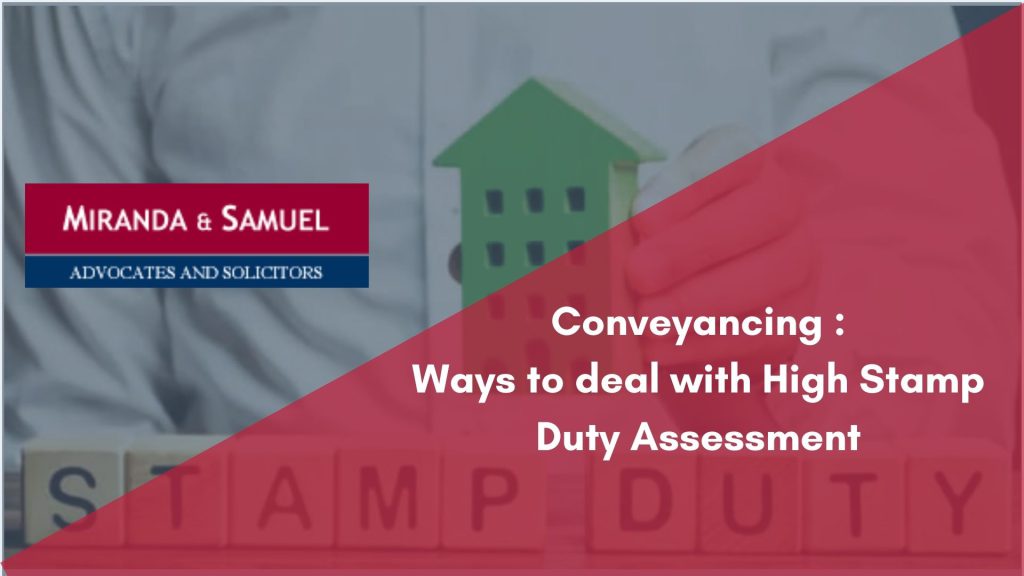In Malaysia, any transaction will be subject to a stamp duty if an instrument is required in order to effect the transaction. The provisions relating to stamp duty liability and the rate of stamp duty chargeable on each instrument in writing has been set out under the Malaysian Stamp Act 1949 (“the MSA”).
However, over the years, there has been an increasing trend for excessive stamp duty assessment or additional assessment notices to be issued by the Stamp Office. Taxpayers are surprised and disappointed especially when seeing the instrument was assessed for such an aggressive sum of stamp duty. Nevertheless, there are legal avenues for the taxpayers to object and appeal against the stamp duty assessment or additional assessment imposed on them.
1. Appeal
Step 1: Make an objection to the Stamp Duty Office
In accordance to Section 38A of the MSA, any person who is dissatisfied with an assessment or additional assessment of stamp duty may object to the assessment or additional assessment by way of written notice, i.e. notice of objection and apply to the Collector of Stamp Duties (“the Collector”) to review the assessment or additional assessment.
The notice of objection shall contain the grounds of objection to the Collector’s assessment or additional assessment and the aggrieved taxpayer may need to furnish further particulars and related information to the grounds of the objection if required by the Collector. The objection shall be made within thirty (30) daysafter the date of the assessment or additional assessment, nonetheless, extension of time to submit the notice of objection may be allowed by the Collector in any case (section 38A (2) of the MSA).
After the Collector has reviewed and determined the objection, the Collector shall notify the aggrieved taxpayer in writing of his decision. The Collector can either decide to maintain the original or additional assessment, or cancel the assessment or make such other assessment in substitution of the original or additional assessment.
Note: The taxpayer is still required to pay the assessed stamp duty within thirty (30) days from the date of the assessment notice even though he is making an objection.
Step 2: Dissatisfied with the Collector’s decision? Appeal to the Court.
The aggrieved taxpayer may then appeal to the High Court under Section 39 of the MSA if he is not satisfied with the Collector’s decision. Such notice of appeal shall be filed and served on the Collector within twenty-one (21) days after the taxpayer is being notified of the Collector’s decision. The appellant may require the Collector to state and sign a case relied upon by the Collector in making the decision. Upon the hearing of the appeal, the High Court shall determine the question of assessment submitted by the appellant and the High Court may choose to cancel or affirm or vary the stamp duty assessment imposed by the Collector. Both the taxpayer and the Collector may then appeal to the Court of Appeal and the Federal Court subsequently if dissatisfied with the decision of the previous Court. It should be noted that although in Section 39 of the Act, it uses the word ‘appeal’ but the High Court is actually hearing the ‘appeal’ in its original jurisdiction and not appellate jurisdiction. Thus, the right of appeal for both parties only exhausted at the level of Federal Court(Pemungut Duti Setem v Lee Koy Eng & Another Appeal [2022] 6 MLRA 209).
2. Revision of acts of Collector
The aggrieved taxpayer may make an application to the Minister of Finance for revision of acts of Collector under Section 78 of the Act which provides that all decisions, orders and acts of the Collector shall be open to revision by the Minister of Finance. The Minister may then revise, alter or modify such decision and may order any instrument to be duly stamped or re-stamped. In practice, this is rarely used by property developers.
3. Judicial Review
An aggrieved taxpayer who is dissatisfied with the assessment done by the Stamp Duty Office may apply for judicial review at the High Court. Nonetheless, it is important to take note that it may be difficult to obtainthe leave from the court to commence the judicial review proceeding as there is an appeal procedure provided for under the Act. Thus, unless an applicant in applying for leave to commence a judicial review can show that there are exceptional circumstances such as lack of jurisdiction, failure to perform statutory duty or breach of natural justice in the assessment process by the Stamp Duty Office, the leave is very unlikely to be granted by the High Court. Also, cases have showed that the applicant is not entitled to initiate a judicial review proceeding as there are available statutory appeal route provided under the Act.
Conclusion
Whilst as a taxpayer paying the stamp duty is a must but the Collector shall not arbitrarily raise the assessment to an excessive sum. The taxpayer should always ensure that the stamp duty assessment is being done accurately and make an Appeal (as set out in point 1 above) if there appears to be an appropriate legal basis to challenge the assessment.
By George Miranda, Joy Sam Jia Qian, Kong Chai Yin
This article is for general information purposes only and does not constitute legal or professional advice. It should not be used as a substitute for legal advice relating to your particular circumstances. Please note that the law may have changed since the date of this article.




